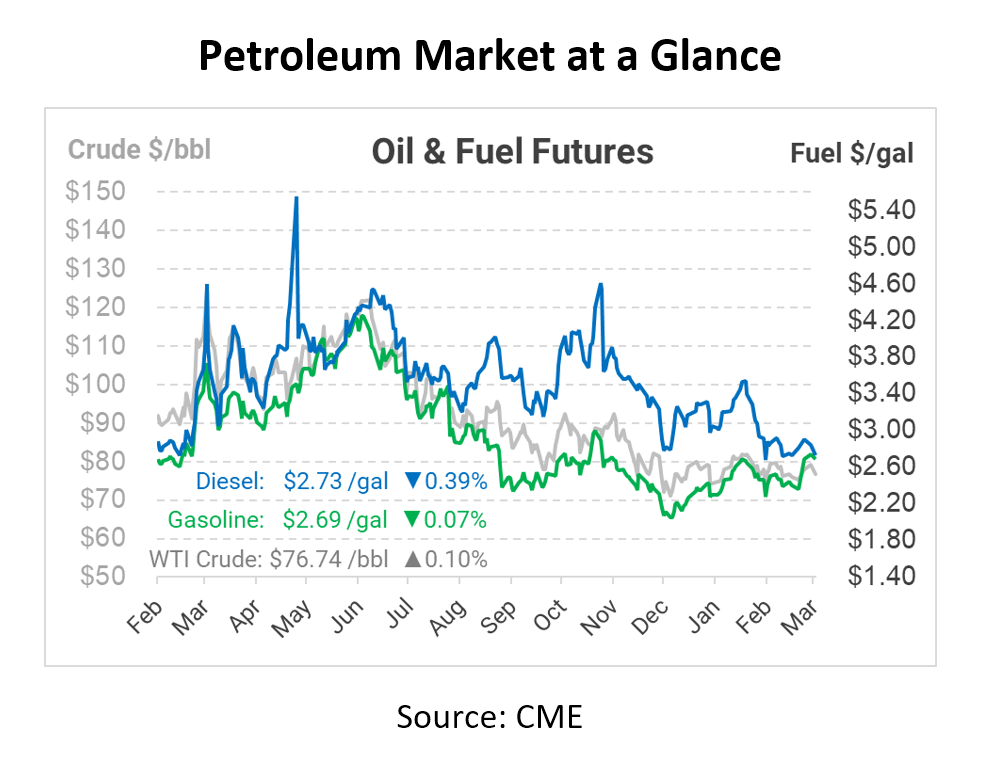
FOB Fuel: What You Need to Know
There are many ways to buy fuel – by the truckload, at a gas station, delivered directly to your equipment, or in bulk. Today, we’ll be talking about that last way of buying – purchasing wholesale fuel in bulk. Some companies don’t need fuel delivered, either because they own or contract their own fuel trucks or because they are a fuel distributor themselves with plans to resell the fuel. This form of purchasing is called Wholesale FOB, which we’ll be exploring today.
What is it?
FOB (Free on Board) fuel refers to the selling of fuel at a specific price that does not include the cost of shipping. The seller is responsible for providing the fuel from the terminal, and the buyer assumes control of all costs and risks associated with the transportation.
Wholesale FOB Fuel can provide more flexibility regarding delivery locations and scheduling, as buyers can choose their shipping arrangements and negotiate directly with suppliers. Fuel rates may be based on an index, day deal rate, or even with a fixed price in some markets. Wholesale FOB is the simplest means of selling fuel for a fuel company, as all the complexity of delivery logistics is transferred to the buyer.
Types of FOB Fuel Contracts
In general, FOB contracts can differentiate based on the type of product being sold and the specific terms of the agreement. For example, a FOB contract for crude oil may specify that the oil is sold on “FOB port,” and the buyer is responsible for all costs associated with the shipment from the port to the final destination. On the other hand, in the downstream space, contracts for refined fuels may specify that the fuel is sold “FOB tanker truck,” and the buyer is responsible for the expenses from the fuel truck to the final point. Wholesalers may also do an in-tank transfer, where product ownership changes in the terminal without ever being transferred to a truck.
In addition to specifying the terms of delivery and transfer of ownership, FOB contracts typically include specifications for the quality and quantity of the fuel being sold. This is important for both buyer and seller to ensure that the fuel meets the agreed-upon standards and that the buyer receives the correct fuel quantity.
When is Wholesale FOB Right?
Wholesale FOB purchases are most often made by fuel resellers, since resellers typically purchase from many different supply partners. Whether they’re buying at the terminal to pick-up and deliver to a customer or to one of their retail fuel stations, resellers have large teams able to manage the complexity of coordinating supply and logistics.
Wholesale FOB fuel may not be the best option for all buyers. Customers who do not own or contract their own fuel trucks may not have the resources to coordinate fuel deliveries. Keeping up with dispatching and managing every fuel truckload can be a burdensome activity without an experienced and robust logistics team behind it. Even some resellers may prefer to have fuel delivered to their location, either to save time or to capitalize on out-of-market arbitrage opportunities.
If you’re a wholesale fuel buyer, your fuel supplier can help you find the options that best fit your company’s needs.
Mansfield’s Wholesale FOB team is ready to respond to your immediate supply needs throughout the US and Canada. Mansfield experts provide the tools and market insights to keep your fuel purchases competitive and efficient. Contact our Wholesale FOB Team today for a quote.
This article is part of Daily Market News & Insights
Tagged: FOB, FOB Fuel Contracts, Wholesale FOB
MARKET CONDITION REPORT - DISCLAIMER
The information contained herein is derived from sources believed to be reliable; however, this information is not guaranteed as to its accuracy or completeness. Furthermore, no responsibility is assumed for use of this material and no express or implied warranties or guarantees are made. This material and any view or comment expressed herein are provided for informational purposes only and should not be construed in any way as an inducement or recommendation to buy or sell products, commodity futures or options contracts.






